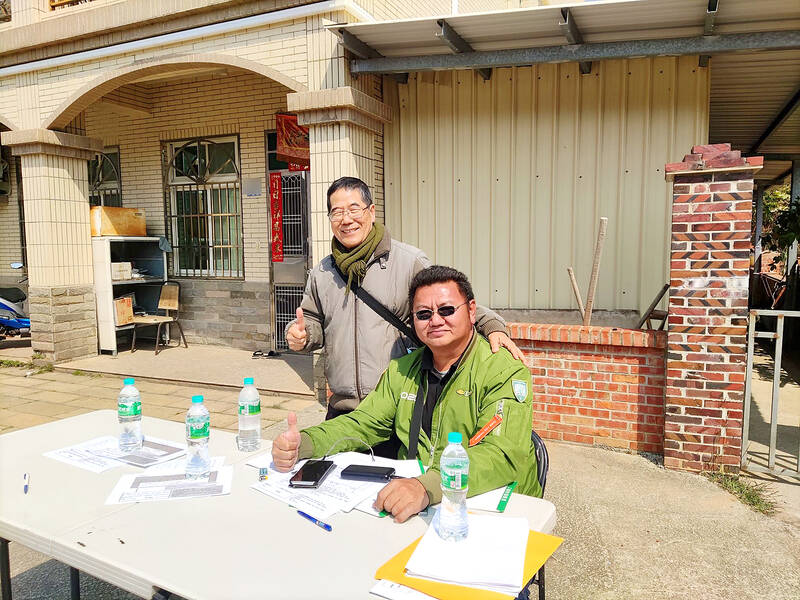President William Lai (賴清德) on Tuesday promulgated amendments to the Public Officials Election and Recall Act (公職人員選舉罷免法) that tighten requirements for petitions used to initiate the recall of elected officials, after the Legislative Yuan rejected a revote requested by the Cabinet last week.
The amendments take effect three days after the promulgation.
The amendments to the act, proposed by Chinese Nationalist Party (KMT) legislators and backed by their counterparts from the Taiwan People’s Party, were passed by a majority of lawmakers on Dec. 20 last year.

Photo courtesy of Wong Ming-chih
The newly amended law requires people initiating a recall petition and those who sign up to such an initiative to provide photocopies of their identification cards when submitting petition signatures.
In the past, campaigners only had to present the ID numbers and registered addresses of those endorsing a recall petition to local election commissions, a process critics said had been abused.
The new law also includes punitive measures, stipulating that anyone found guilty of using someone else’s identification or forging an ID for a recall petition could face up to five years in prison or a fine of up to NT$1 million (US$30,536).
The Executive Yuan has argued that the amended recall act would “exceedingly restrict” the public’s right to recall elected officials and “significantly increase the burden” of local electoral authorities.
The Cabinet on Jan. 24 requested the legislature to reconsider the amendments based on the provisions of the Constitution, saying it would be difficult to execute.
However, the Legislative Yuan on Tuesday last week voted to uphold the new legislation and sent it to the Presidential Office a day later, paving the path to its promulgation by Lai on Tuesday.
Democratic Progressive Party (DPP) caucus chief executive Rosalia Wu (吳思瑤) on Tuesday said that the party would follow the Constitution and seek a remedy.
The DPP is to go to the Judicial Yuan at 10:30am today to request an injunction and constitutional interpretation of the amendments, DPP caucus whip Ker Chien-ming (柯建銘) said yesterday.
However, the newly amended Constitutional Court Procedure Act (憲法訴訟法) mandates that a minimum of 10 grand justices hear and rule on a case, and an unconstitutional ruling be supported by at least nine justices.
Currently, the Constitutional Court has only eight grand justices, as the Legislative Yuan has declined to approve a new slate of nominations put forward by Lai in December last year.
Meanwhile, recall campaigners in Kinmen County yesterday rushed to compile signatures and submit a petition to recall KMT Legislator Chen Yu-jen (陳玉珍) before the new amendments take effect.
The campaigners set up signing stations and delivered the petitions on a flight to Taipei, recall campaign leader Wong Ming-chih (翁明志) said.
This is a chance to convey Kinmen’s true values and amplify Kinmen’s voice, Weng said.
Additional reporting by Chen Cheng-yu and Wu Cheng-ting

Taipei, New Taipei City, Keelung and Taoyuan would issue a decision at 8pm on whether to cancel work and school tomorrow due to forecasted heavy rain, Keelung Mayor Hsieh Kuo-liang (謝國樑) said today. Hsieh told reporters that absent some pressing reason, the four northern cities would announce the decision jointly at 8pm. Keelung is expected to receive between 300mm and 490mm of rain in the period from 2pm today through 2pm tomorrow, Central Weather Administration data showed. Keelung City Government regulations stipulate that school and work can be canceled if rain totals in mountainous or low-elevation areas are forecast to exceed 350mm in

EVA Airways president Sun Chia-ming (孫嘉明) and other senior executives yesterday bowed in apology over the death of a flight attendant, saying the company has begun improving its health-reporting, review and work coordination mechanisms. “We promise to handle this matter with the utmost responsibility to ensure safer and healthier working conditions for all EVA Air employees,” Sun said. The flight attendant, a woman surnamed Sun (孫), died on Friday last week of undisclosed causes shortly after returning from a work assignment in Milan, Italy, the airline said. Chinese-language media reported that the woman fell ill working on a Taipei-to-Milan flight on Sept. 22

COUNTERMEASURE: Taiwan was to implement controls for 47 tech products bound for South Africa after the latter downgraded and renamed Taipei’s ‘de facto’ offices The Ministry of Foreign Affairs is still reviewing a new agreement proposed by the South African government last month to regulate the status of reciprocal representative offices, Minister of Foreign Affairs Lin Chia-lung (林佳龍) said yesterday. Asked about the latest developments in a year-long controversy over Taiwan’s de facto representative office in South Africa, Lin during a legislative session said that the ministry was consulting with legal experts on the proposed new agreement. While the new proposal offers Taiwan greater flexibility, the ministry does not find it acceptable, Lin said without elaborating. The ministry is still open to resuming retaliatory measures against South

1.4nm WAFERS: While TSMC is gearing up to expand its overseas production, it would also continue to invest in Taiwan, company chairman and CEO C.C. Wei said Taiwan Semiconductor Manufacturing Co (TSMC) has applied for permission to construct a new plant in the Central Taiwan Science Park (中部科學園區), which it would use for the production of new high-speed wafers, the National Science and Technology Council said yesterday. The council, which supervises three major science parks in Taiwan, confirmed that the Central Taiwan Science Park Bureau had received an application on Friday from TSMC, the world’s largest contract chipmaker, to commence work on the new A14 fab. A14 technology, a 1.4 nanometer (nm) process, is designed to drive artificial intelligence transformation by enabling faster computing and greater power